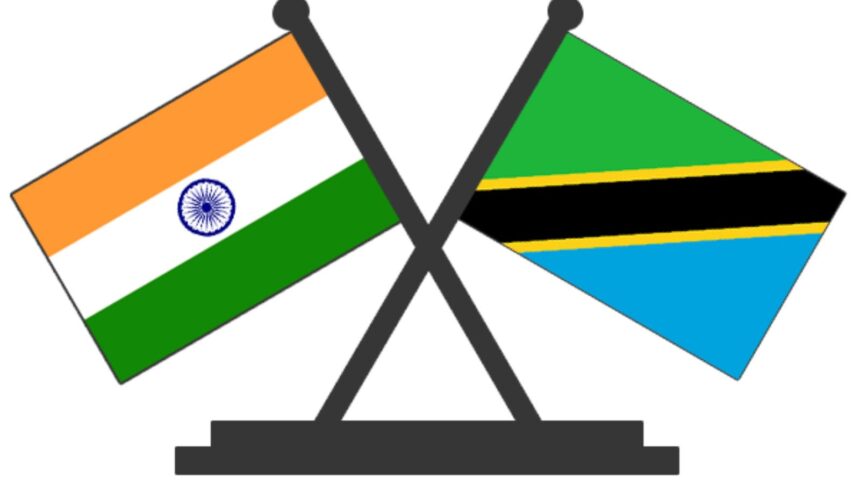In a significant diplomatic move, the President of the United Republic of Tanzania, Her Excellency Samia Suluhu Hassan, is poised to embark on an official visit to India from October 8th to October 11th, 2023. This visit comes in response to an invitation extended by the President of the Republic of India, Her Excellency Droupadi Murmu.
For over a millennium, long before the era of European colonialism, East Africa, including Tanzania, played host to numerous traders from India, the Middle East, and the Far East. These traders engaged in various businesses, including the trade of ivory, textiles, cotton, spices, weapons, and more.
Formal diplomatic relations between Tanzania and India commenced after Tanganyika gained independence in 1961. India was among the first nations to establish an embassy in Tanzania in 1961, reciprocated by Tanganyika opening its embassy in India in 1962. Over the years, the relations between these two nations have blossomed across various diplomatic facets, including economy, healthcare, technology, finance, trade, and more.
President Samia Suluhu Hassan’s visit to India marks a historic milestone, occurring eight years after the last visit by former President Jakaya Kikwete. The primary objective of President Samia’s visit to India is to showcase the myriad of business and investment opportunities in Tanzania, boost the Tanzanian economy, create job opportunities, and enhance the overall quality of life for Tanzanians.
In the 21st century, as Tanzania strives for economic emancipation, technological advancement, agricultural development, and progress in various other sectors, India stands as a crucial partner for collaboration, given its significant strides in development.
Here are key reasons why it is imperative for Tanzania to strengthen its ties with India:
Indian Economy: India’s economy is experiencing rapid growth, with the International Monetary Fund (IMF) forecasting that India will surpass all major economies in economic growth by 2023. While economies like Germany, the UK, and others are experiencing sluggish growth, India is projected to grow by 5.9%. This presents a golden opportunity for Tanzania to engage in trade with India. Strengthening economic ties with India can bolster Tanzania’s economy, particularly by encouraging Indian investment in sectors such as agriculture and mining, which have the potential to generate significant employment.
Technology: India has made remarkable progress in the field of technology. Individuals of Indian origin helm leading global tech giants such as Apple, Google, and Microsoft. India recently achieved a successful moon mission and manufactures automobiles, motorcycles, mobile phones, and various other technological products.
For many African nations, achieving such feats is a distant dream. President Samia Suluhu’s visit to India presents Tanzania with a prime opportunity to leverage its longstanding friendship with India, thereby benefiting from Indian technology. Tanzania requires technological advancements in agriculture, fishing, livestock farming, transportation, etc. Collaboration with India is essential in this regard, as India is the top exporter of IT products, boasts the third-largest pharmaceutical sector globally, and has a burgeoning contract research segment.
Research: Like any nation, Tanzania needs to invest more in research. Research in various sectors, such as agriculture, fishing, and livestock farming, is vital for national development. Tanzania needs to conduct research and learn from nations excelling in these fields.
As of 2022, India allocated 2% of its Gross Domestic Product (GDP) to research. Research spending in the IT sector in India is set to increase by 7%, while the healthcare and medical research sector in India generated a staggering USD 9 billion from research. In 2022, India had 5,018 ongoing research projects, 3,702 publications, 30,532 ongoing projects, and 797 innovations. Tanzania can undoubtedly benefit from India’s experience in research.
President Samia Suluhu’s visit to India is poised to address these three pivotal aspects mentioned above. During her stay in India, President Samia Suluhu will sign 15 agreements covering various fields such as agriculture, education, the blue economy, defence, maritime security, healthcare, information and communication technology (ICT), trade and investment, water resources, and more.
President Samia Suluhu is a visionary leader recognising India’s pivotal role in contemporary and future global development. She understands that this opportunity must not be missed, as the time for Tanzanian progress is now, and India is poised to contribute significantly to Tanzania’s development.
In conclusion, President Samia Suluhu Hassan’s visit to India signifies a momentous step in strengthening bilateral relations between Tanzania and India while also unlocking immense potential for economic growth and technological advancement in Tanzania. This historic visit underscores the commitment of both nations to fostering a prosperous and mutually beneficial partnership for the betterment of their citizens.


